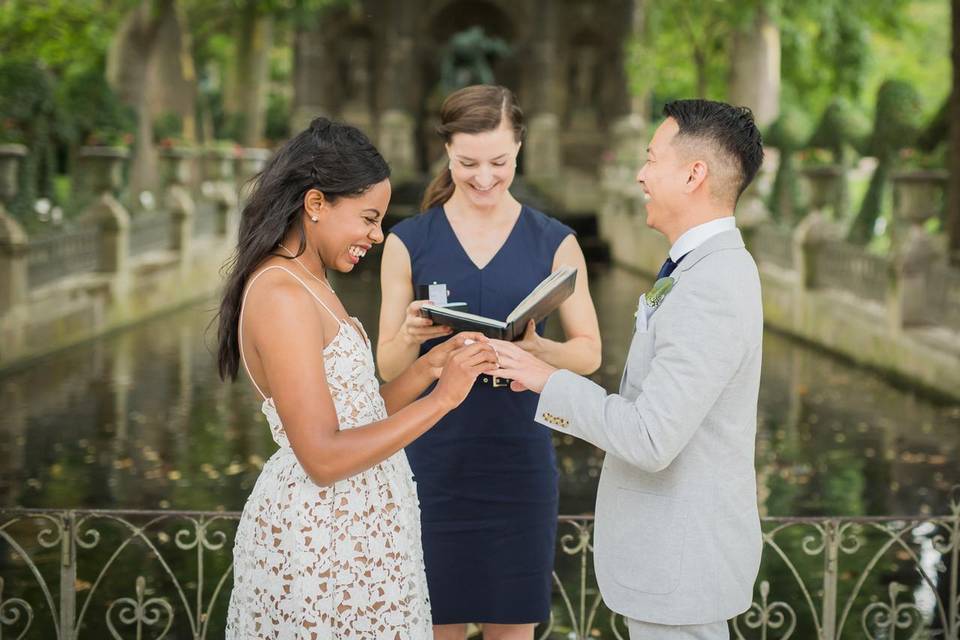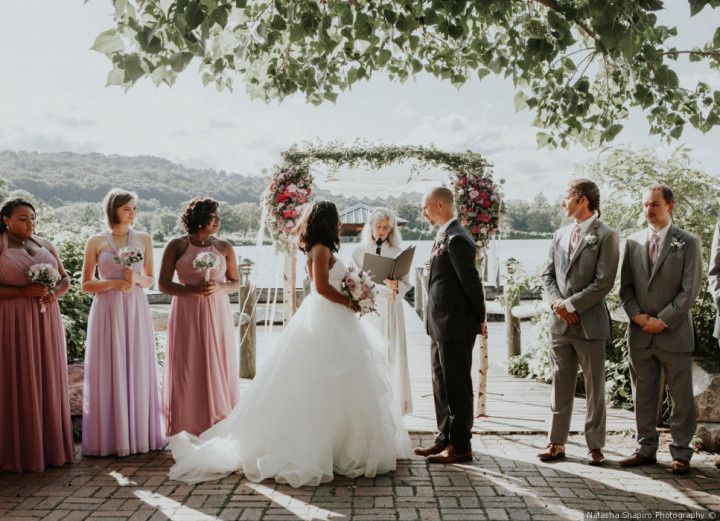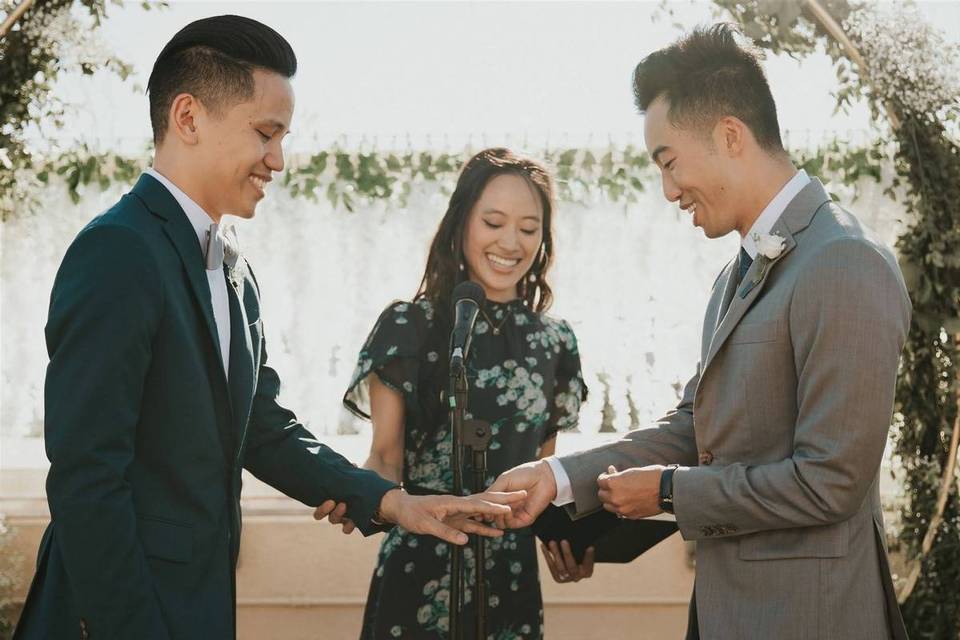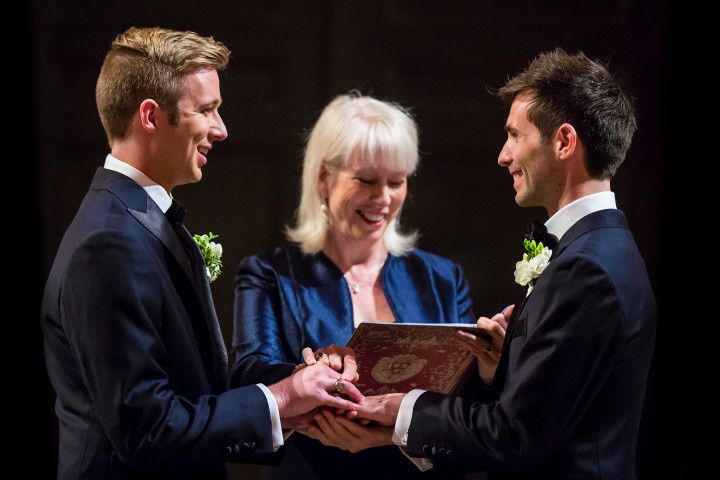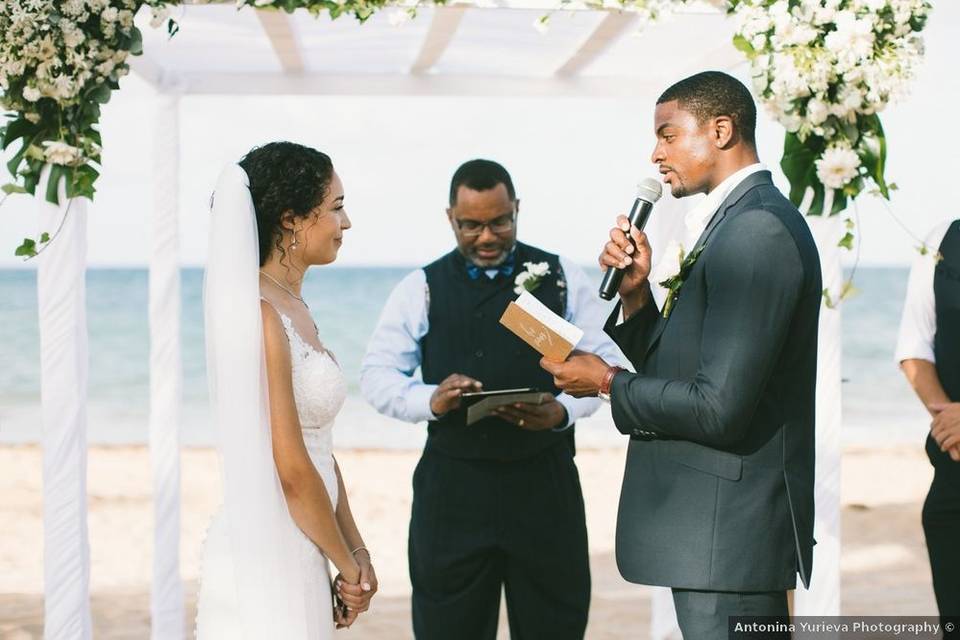11 Questions a Wedding Officiant is Going to Ask You
You may have lots of questions for your wedding officiant—but they’re also going to have questions for you! Make sure you’re well-prepared and have your answers ready!
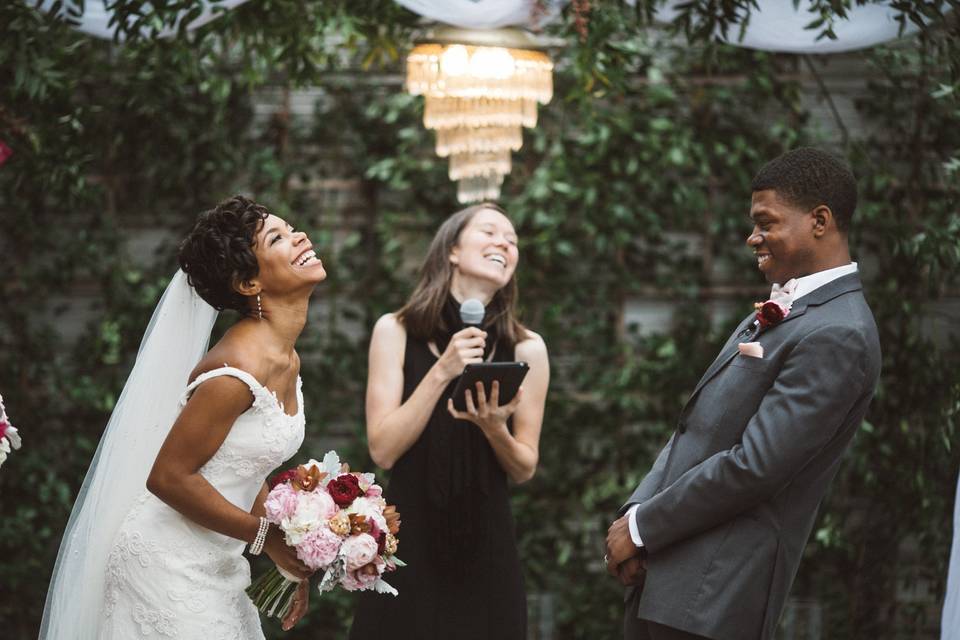
If you’re getting married, chances are you’ll need a wedding officiant - and it turns that that wedding officiants usually have lots of questions for couples. Whether your wedding is religious or secular, your officiant will want to know what type of ceremony you want, as well as the story of you. It is, after all, those personal details that bring your loved ones to tears as you exchange vows. Getting ready to hire an officiant for your wedding day?
Here are a few of the most common wedding officiant questions for couples.
When, Where, and Who?
This may be one of the most obvious wedding officiant questions for a couple. Says celebrant Robin Eisenberg of Elkins Park, Pennsylvania, “The purpose of ‘when’ is to determine if I’m available on the date and time of their wedding and to see how far in advance the wedding is. The purpose of ‘where’ is to get a general idea about the formality of the wedding, determine how much travel is involved for me to get to the venue, and to know if I’ve worked at that venue before. The answers help me decide if this is a wedding I want to, and am able, to pursue. And the ‘who’ question is because generally one member of the couple contacts me but doesn’t tell me who the other member is! Before I meet with the couple, it’s helpful to know how to greet them.”
What role do your families play in your lives?
“I try to get a sense of how connected the couple is to their families, or how estranged,” says Eisenberg. “It also gives me a sense of how many family members are involved in the ceremony. Sometimes the couple was introduced by family members, which is a fun story to share. And I always like to acknowledge the parents in the ceremony by name, so this helps me properly express the couples’ appreciation for them.”
How do you want to remember your ceremony? What do you want your friends and family to remember?
“My objective is to develop the ideal ceremony for a specific couple, so I ask a lot of different questions to figure out what that will look like. Perfect is different for each couple, and directly asking them to describe their perfect ceremony isn’t always effective, so this is a good way to work backwards into the ceremony,” says Rabbi Linda Portnoy Goldberg of White Plains, New York.
What have you seen at other weddings that you liked or not liked?
Imitation is the highest form of flattery! “I watch carefully to see what couples casually toss out and what lights up their eyes. Was it elegant? Fun? Participative? Traditional? I learn a lot from these answers, and the better they can identify elements that they love, the better I can craft the details to meet their goals,” Rabbi Goldberg explains.
How did you meet? When did you fall in love?
An important wedding officiant question for couples is probably one you’ve answered many times before—how you met! “Often, they way the couple met and later fell in love, and how they tell those stories, gives me both a way to begin telling their story and leads to the theme of their wedding ceremony. Who planned the first date? Who fell in love first? Is the location of the first date important? Is this a relationship built on surprise and adventure or one more focused on being at home with each other?” Eisenberg explains.
How did you get engaged?
“Each half of the couple often has a slightly different recollection of the engagement story,” says Eisenberg. “One may insist it was Wednesday, while the other might say it was Tuesday. I like to hear the differences. I also like to know if the proposer did something grand or simple. Was the proposee surprised? Was the proposal expected? Who chose the ring? All these elements are important in defining who the couple is, both as individuals and together. Retelling the engagement story can also add a touch of humor to the ceremony, or it might be so touching that everyone starts crying. Both are good!”
How would you describe your partner?
“I ask each person to email me a description of their partner and what they like best about him or her - with specific examples,” says Rabbi Goldberg. “I want to know how they are different or similar, and often use the Positive Psychology list of 24 character traits (e.g., generosity, humor, humility, curiosity) and ask them for the other’s signature strengths.”
Who are the best man and maid of honor?
“I ask my couples to ramble on about these people a little bit, telling me why they chose them,” says Dr. Rev. Cynthia Capaccio of Boynton Beach, Florida. After all, these people are standing next to you for a reason!
Who are your guests? How do they fit into your lives?
“Are they friends, family members, or work connections?” asks Rabbi Goldberg. The relationship you have with your guests will impact how they relate back to the content of your ceremony.
Do you want your ceremony to include any traditional prayers?
Says Eisenberg, “I didn’t always ask this question but, having written a lovely contemporary ceremony for a couple who weren’t connected to their religions, they decided after reading the ceremony that they really did want to honor their Catholic traditions. We were able to have prayers and Biblical excerpts read by family members and we included God in their marriage vows. So now I ask as a way to include those aspects throughout the ceremony planning process.”
Are there any traditions or rituals you’d like to include? Any you want to leave out?
Your ceremony should reflect you and your partner—so be prepared to answer these important wedding officiant questions as a couple. “I want to be able to incorporate the rituals or traditions each half of the couple wants into their ceremony,” says Eisenberg. “This is particularly important for interfaith couples, who want to create a unified ceremony that is connected to their pasts or to their families’ observances. Another reason for this question is that the couple may say they want a Unity Ritual, but aren’t sure what kind. I’ll work with them to design a ritual that is appropriate for them and that takes into consideration the location and theme of their wedding. The other reason for this question is to determine if there is some research I need to do to enable me to lead the activity they want. If the couple wants a ‘tie the knot’ ritual and I’ve never done that before, I need to learn how and practice.”

